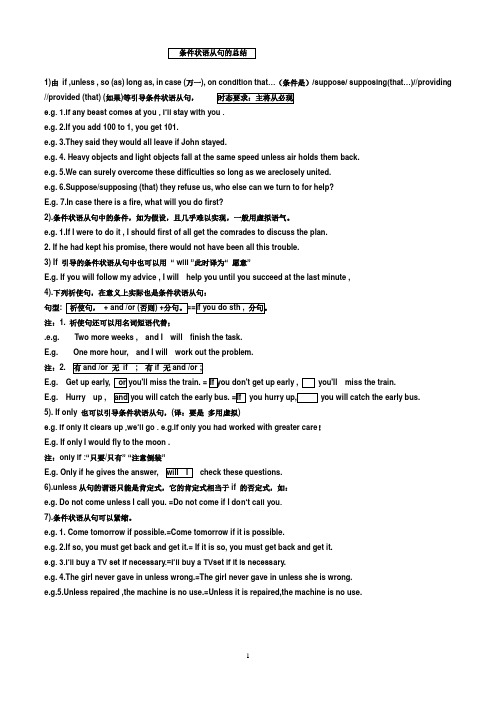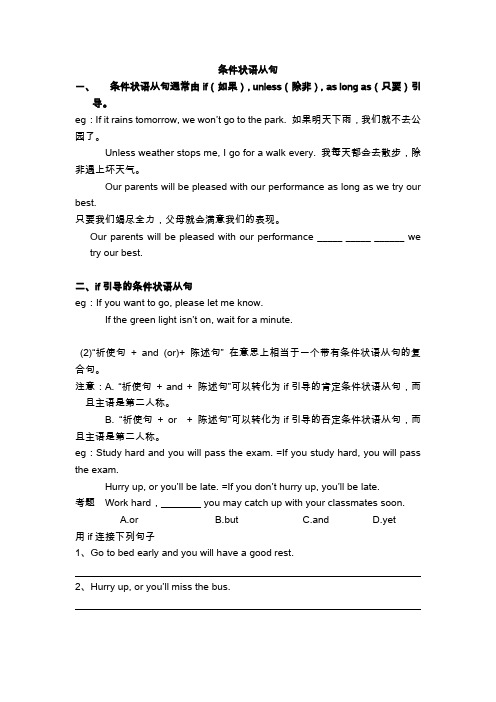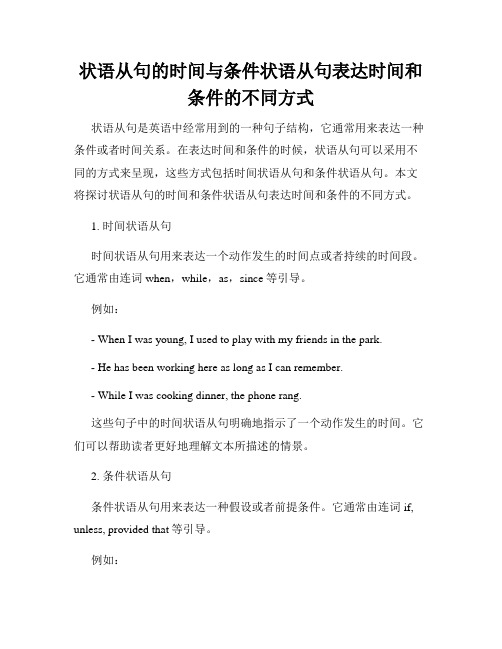条件状语从句结构
条件状语从句的总结

1)由if ,unless , so (as) long as, in case (万一), on condition that…(条件是)/suppose/ supposing(that…)//providing//provided (that) (如果)等引导条件状语从句,e.g. 1.If any beast comes at you , I’ll stay with you .e.g. 2.If you add 100 to 1, you get 101.e.g. 3.They said they would all leave if John stayed.e.g. 4. Heavy objects and light objects fall at the same speed unless air holds them back.e.g. 5.We can surely overcome these difficulties so long as we areclosely united.e.g. 6.Suppose/supposing (that) they refuse us, who else can we turn to for help?E.g. 7.In case there is a fire, what will you do first?2).条件状语从句中的条件,如为假设,且几乎难以实现,一般用虚拟语气。
e.g. 1.If I were to do it , I should first of all get the comrades to discuss the plan.2. If he had kept his promise, there would not have been all this trouble.3) If 引导的条件状语从句中也可以用“ will ”此时译为“ 愿意”E.g. If you will follow my advice , I will help you until you succeed at the last minute ,4).下列祈使句,在意义上实际也是条件状语从句:句型注:1. 祈使句还可以用名词短语代替;.e.g. Two more weeks , and I will finish the task.E.g. One more hour, and I will work out the problem.注:2.E.g. you'll miss the train.E.g. Hurry up , you will catch the early bus.5). If only 也可以引导条件状语从句,(译:要是多用虚拟)e.g. If only it clears up ,we’ll go . e.g.If only you had worked with greater care!E.g. If only I would fly to the moon .注:only if :“只要/只有” “注意倒装”E.g. Only if he gives the answer, check these questions.6).unless从句的谓语只能是肯定式,它的肯定式相当于if 的否定式,如:e.g. Do not come unless I call you. =Do not come if I do n’t call you.7).条件状语从句可以紧缩。
条件状语从句

条件状语从句•条件状语从句基本概念•条件状语从句类型及用法•与其他从句比较与转换•典型误区及纠正方法目录•实战演练与技巧分享条件状语从句基本概念01定义与作用定义条件状语从句是表达某种假设条件或条件的从句,它描述了一个事件或情况发生的条件。
作用条件状语从句在句子中起到连接主句和从句的作用,表达条件关系,使得句子更加完整和丰富。
结构形式if引导的条件状语从句if + 一般现在时/一般过去时,主句用一般将来时/一般过去将来时。
unless引导的条件状语从句unless + 一般现在时/一般过去时,主句用一般将来时/一般过去将来时。
as long as引导的条件状语从句as long as + 一般现在时/一般过去时,主句用一般将来时/一般过去将来时。
表达一个假设的条件或情况,如“如果你努力学习,你会取得好成绩。
”假设条件条件限制条件对比对主句中的动作或状态进行条件限制,如“除非你同意,否则我不会参加。
”通过对比不同条件来表达不同的结果或可能性,如“只要你愿意,随时都可以来找我。
”030201语义功能条件状语从句类型及用法02真实条件句常见引导词if, unless, as long as, on condition that等。
例子If it rains tomorrow, we will stay at home. (如果明天下雨,我们就待在家里。
)1 2 3与现在事实相反、与过去事实相反、与将来事实相反。
分为三种情况if, as if, as though等。
常见引导词If I were you, I would not do that. (如果我是你,我就不会那样做。
)例子非真实条件句用于表示与事实相反的假设情况。
在非真实条件句中,虚拟语气通过动词形式的变化来表示不同的时间概念。
常见引导词:if only, wish,as if/as though等。
例子:If only I had moremoney, I could buy abetter car. (要是我有更多的钱就好了,我就可以买一辆更好的车。
if条件状语从句语法

当句末为or not时,引导词只能用whether而不能用if.
第6页
If 与whether 区分
1. I don’t know _____ he will come or not. 与or not 连用只能用whether
2. I don’t care of ______ he is handsome. 介词后只能用whether
3 If she__w__in_s___ (win) the prize ,we _w_i_ll_b__e_(be) happy. 4.If I __d_o_n_’__t _e_at (not,eat )so much ,I _w__il_l _g_e_t__(get) thinner.
5.If you __te_l_l __(tell) them, they __w_o_n_’__t__b_e_li_e_ve(not,believe) you. 6 I __w_i_ll_s_t_a_y_(stay) at home,If it ___ra_i_n_s____( rain). 7.If it _d__o_e_s_n_’__t ___(not,rain) ,I __w__il_l _g_o__( go) out.
5. 以下从句中will不是未来时助动词,而是情态动词。 翻译为“愿意”。
If you will excuse me,I really must go to bed . 假如你能原谅我话,我真要睡觉了。
If you will wait a minute ,I’ll go and tell my mother that you are here .
If you are free this weekend, what will you do ?
条件状语从句

条件状语从句一、条件状语从句通常由if(如果), unless(除非),as long as(只要)引导。
eg:If it rains tomorrow, we won’t go to the park. 如果明天下雨,我们就不去公园了。
Unless weather stops me, I go for a walk every. 我每天都会去散步,除非遇上坏天气。
Our parents will be pleased with our performance as long as we try our best.只要我们竭尽全力,父母就会满意我们的表现。
Our parents will be pleased with our performance _____ _____ ______ we try our best.二、if引导的条件状语从句eg:If you want to go, please let me know.If the green light isn’t on, wait for a minute.(2)“祈使句+ and (or)+ 陈述句” 在意思上相当于一个带有条件状语从句的复合句。
注意:A. “祈使句+ and + 陈述句”可以转化为if引导的肯定条件状语从句,而且主语是第二人称。
B. “祈使句+ or + 陈述句”可以转化为if引导的否定条件状语从句,而且主语是第二人称。
eg:Study hard and you will pass the exam. =If you study hard, you will pass the exam.Hurry up, or you’ll be late. =If you don’t hurry up, you’ll be late.考题Work hard,________ you may catch up with your classmates soon.A.orB.butC.andD.yet用if连接下列句子1、Go to bed early and you will have a good rest.2、Hurry up, or you’ll miss the bus.三、if从句与主句具有以下特点:1.If从句中用一般现在时,表示未来的一种条件,从句中可以加时间状语。
非谓语动词用法精讲不定式作条件状语的用法和常见结构

非谓语动词用法精讲不定式作条件状语的用法和常见结构非谓语动词用法精讲:不定式作条件状语的用法和常见结构一、不定式作条件状语的用法在复合句中,不定式可以作为条件状语来表示一种假设、前提或条件。
它可以解释或说明主句中的行为或状态发生的条件。
不定式作条件状语时,常与含有情态动词should或情态动词原形must、can等的虚拟语气连用,表示主句中所述的行为或状态是一种假设或基于某种条件的结果。
以下是几种常见的结构:1. 条件状语放在主句之前例如:Should you need any further assistance, please do not hesitate to contact us.如果您需要进一步的帮助,请随时与我们联系。
2. 条件状语放在主句之后例如:He cannot afford to go on vacation unless he saves more money.除非他存更多的钱,否则他负担不起去度假。
3. 倒装结构在条件状语中使用否定副词或词组时,为了强调,在主句中可以使用部分倒装结构。
例如:Only by studying hard can you pass the exam.只有努力学习,你才能通过考试。
4. if引导的条件状语从句如果条件状语是以if引导的状语从句,可以使用以下几种结构:a. 如果动词在句子中作谓语,动词后面直接接不定式例如:If you want to succeed, you must work hard.如果你想成功,你必须努力工作。
b. 如果主语是人称代词,可以省略if,并将动词原形置于主语之前例如:Should I see him, I will tell him the news.如果我见到他,我会告诉他这个消息。
二、常见结构1. 不定式作目的状语不定式可以表示一个行动或状态是为了实现某个目的。
例如:He went to the library to borrow some books.他去图书馆是为了借书。
条件状语从句语法讲解

条件状语从句语法讲解
条件状语从句主要由if引导:
if条件句:条件句用于陈述语气,表示假设的情况可能发生,其中if 是“如果”的意思。
1.If it doesn’t rain , I will go to the park tomorrow.
从句主句
2.If you are in trouble , you can ask me for help.
从句主句
3.If you see him tomorrow , give him this book.
从句主句
注意:1.在条件状语从句,主句用一般将来时,从句则不能用一般将来时态,只能用一般现在时态来代替一般将来时态
2.主句含有情态动词或是祈使句时,从句也用一般现在时。
(总之,条件状语从句中不能出现一般将来时态)
习题:判断正误,如有错误,请改正。
1.I don’t now if it will rain tomorrow.
2.If you will excuse me,I will be very happy.
3.If he will come tomorrow ,let me know.
4.If my friend will visit me tomorrow, I can go out with her.。
状语从句的时间与条件状语从句表达时间和条件的不同方式

状语从句的时间与条件状语从句表达时间和条件的不同方式状语从句是英语中经常用到的一种句子结构,它通常用来表达一种条件或者时间关系。
在表达时间和条件的时候,状语从句可以采用不同的方式来呈现,这些方式包括时间状语从句和条件状语从句。
本文将探讨状语从句的时间和条件状语从句表达时间和条件的不同方式。
1. 时间状语从句时间状语从句用来表达一个动作发生的时间点或者持续的时间段。
它通常由连词when,while,as,since等引导。
例如:- When I was young, I used to play with my friends in the park.- He has been working here as long as I can remember.- While I was cooking dinner, the phone rang.这些句子中的时间状语从句明确地指示了一个动作发生的时间。
它们可以帮助读者更好地理解文本所描述的情景。
2. 条件状语从句条件状语从句用来表达一种假设或者前提条件。
它通常由连词if, unless, provided that等引导。
例如:- If it rains tomorrow, we will stay at home.- I will go to the concert with you, provided that I finish my homeworkin time.- Unless you study hard, you won't pass the exam.这些句子中的条件状语从句表达了一种可能的条件和其结果之间的关系。
它们可用于表达真实条件、虚拟条件或者可能性条件。
3. 表达时间和条件的其他方式除了时间状语从句和条件状语从句外,还有其他一些方式可以用来表达时间和条件的关系。
a) “when”和“if”引导的状语从句的省略在某些情况下,时间状语从句和条件状语从句的引导词可以被省略。
条件状语从句的归纳总结

条件状语从句的归纳总结条件状语从句是英语中重要且常用的一种从句类型,它用于表示某个动作或情况发生的前提条件。
在句子中,条件状语从句通常由指示条件的连词引导,如:if(如果)、unless(除非)、provided that(倘若)、as long as(只要)等。
本文将对条件状语从句进行归纳总结,并提供常见的应用实例。
一、以if引导的条件状语从句1. 表示真实条件“如果”某个条件成立,就会发生某个结果。
例句1: If it rains tomorrow, we will stay at home.(如果明天下雨,我们会待在家里。
)例句2: If you study hard, you will pass the exam.(如果你努力学习,你会通过考试。
)2. 表示与现在或将来相反的假设“如果”某个条件成立,但事实上并不成立。
例句1: If I were you, I would apologize to her.(如果我是你,我会向她道歉。
)例句2: If I had enough money, I would buy a new car.(如果我有足够的钱,我会买一辆新车。
)3. 表示过去某个假设的结果“如果”过去某个条件成立,就会有相应的结果。
例句: If he had studied harder, he would have passed the exam.(如果他当时学得更努力,他就会通过考试。
)二、以unless引导的条件状语从句unless的意思是“除非”,用于表示某个条件不成立时才会发生某个结果。
例句1: We won't go shopping unless it stops raining.(除非停止下雨,否则我们不会去购物。
)例句2: You won't lose weight unless you exercise regularly.(除非你定期锻炼,否则你无法减肥。
- 1、下载文档前请自行甄别文档内容的完整性,平台不提供额外的编辑、内容补充、找答案等附加服务。
- 2、"仅部分预览"的文档,不可在线预览部分如存在完整性等问题,可反馈申请退款(可完整预览的文档不适用该条件!)。
- 3、如文档侵犯您的权益,请联系客服反馈,我们会尽快为您处理(人工客服工作时间:9:00-18:30)。
条件状语从句结构
【篇幅】
一、什么是条件状语从句
1、条件状语从句是一种从句,用来表示或描述一种条件,其中常涉及“如果”“假如”等关联词。
它是一个主句和一个从句组成,从句中往往用“could, would, should, might, may”等情态动词,来表示对主句的情况做出虚拟假设,表示“如果真是这样的情况”。
2、条件状语从句的结构可以有主+谓结构(即if+一般现在时),主+谓+宾结构(即if+一般过去时);也可以是主+情态+谓结构(即if+情态动词+动词原形)。
二、举例说明
1、主+谓结构:
例如:If you need any help, please tell me.
2、主+谓+宾结构:
例如:If he knew the truth, he would be angry.
3、主+情态+谓结构:
例如:If you could help me, I would really appreciate it.
三、注意事项
1、条件状语从句一般都是用一般时(一般现在时,一般过去时),即
使从句的动作以start, stop, intend, plan等这些动词开头,也要用一般时。
2、另外,条件状语从句也不可以用现在进行时,也不…。
